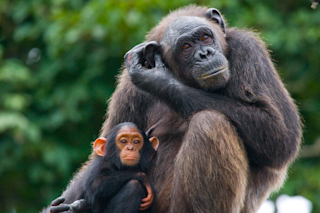"Advertising for monkeys" is just too good a phrase to pass up. Even since ads created for a study investigating whether monkeys respond to billboards debuted at the Cannes Lions ad conference
, the headlines
have been
flowing freely
. We learn
Yale primatologist Laurie Santos and two ad executives came up with the idea at last year's TED, after Santos gave a talk
on her experiments showing that monkeys that learn to use money are as irrational about it as we are. Ad firm Proton has now developed two billboards to hang outside capuchin monkeys' enclosures, and the researchers plan to see whether they will prefer one kind of food, or "brand," over another when it is shown in close proximity to some titillating photos, including a "graphic shot" of a female monkey exposing her genitals and a shot of the troop's alpha male with the food. Once the ...













